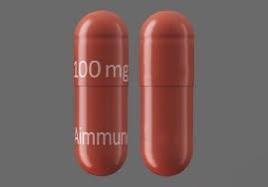Peanut Allergen Powder Side Effects
Medically reviewed by Drugs.com. Last updated on May 12, 2025.
Applies to peanut allergen powder: oral capsule, oral powder.
Important warnings
This medicine can cause some serious health issues
Oral route (capsule; powder)
Peanut (Arachis hypogaea) Allergen Powder-dnfp can cause anaphylaxis, which may be life-threatening and can occur at any time during.
Prescribe injectable epinephrine, instruct and train patients on its appropriate use, and instruct patients to seek immediate medical care upon its use.
Do not administer Peanut (Arachis hypogaea) Allergen Powder-dnfp to patients with uncontrolled asthma.
Dose modifications may be necessary following an anaphylactic reaction.
Observe patients during and after administration of the Initial Dose Escalation and the first dose of each Up-Dosing level, for at least 60 minutes.
Because of the risk of anaphylaxis, Peanut (Arachis hypogaea) Allergen Powder-dnfp is available only through a restricted program under a Risk Evaluation and Mitigation Strategy (REMS) called the Palforzia REMS.
Precautions
It is very important that your doctor check your child's progress at regular visits to make sure this medicine is working properly and to check for unwanted effects.
You should not be given this medicine for the first time if you have had a severe allergic reaction (anaphylaxis) within the previous 60 days.
This medicine may cause a serious allergic reaction, called anaphylaxis, which can be life-threatening and requires immediate medical attention. Tell your doctor right away if your child has a rash, itching, hoarseness, trouble breathing, trouble swallowing, or any swelling of your hands, face, or mouth after using this medicine.
This medicine may cause eosinophilic gastrointestinal disease, including eosinophilic esophagitis (allergic swelling of the esophagus). Check with your doctor right away if you have trouble swallowing, vomiting, nausea, heartburn, chest pain, or stomach pain.
Do not take other medicines unless they have been discussed with your doctor. This includes prescription or nonprescription (over-the-counter [OTC]) medicines and herbal or vitamin supplements.
Serious side effects
Along with its needed effects, peanut allergen powder may cause some unwanted effects. Although not all of these side effects may occur, if they do occur they may need medical attention.
Check with your doctor immediately if any of the following side effects occur while taking peanut allergen powder:
More common side effects
- chest tightness
- cough
- difficulty swallowing
- dizziness
- fast heartbeat
- hives, itching, skin rash
- nausea
- puffiness or swelling of the eyelids or around the eyes, face, lips, or tongue
- stomach pain
- throat irritation and tightness
- trouble breathing
- unusual tiredness or weakness
- vomiting
Other side effects
Some side effects of peanut allergen powder may occur that usually do not need medical attention. These side effects may go away during treatment as your body adjusts to the medicine. Also, your health care professional may be able to tell you about ways to prevent or reduce some of these side effects.
Check with your health care professional if any of the following side effects continue or are bothersome or if you have any questions about them:
More common side effects
- ear itching
- numbness or itching of the mouth
- runny nose
- sneezing
See also:
For healthcare professionals
Applies to peanut allergen powder: oral powder.
General adverse events
The most common adverse reactions included abdominal pain, vomiting, nausea, oral pruritus, oral paresthesia, throat irritation, cough, rhinorrhea, sneezing, throat tightness, wheezing, dyspnea, pruritus, urticaria, anaphylactic reaction, abdominal discomfort, upper abdominal pain, and ear pruritus.
The most common adverse reactions leading to discontinuation of treatment were abdominal pain, vomiting, nausea, and systemic allergic reaction, including anaphylaxis.[Ref]
Dermatologic
- Very common (10% or more): Pruritus (up to 32.5%), urticaria (up to 28.4%)[Ref]
Gastrointestinal
- Very common (10% or more): Abdominal pain (up to 67.1%), vomiting (up to 36.5%), nausea (up to 32.3%), oral paresthesia (up to 13.6%), oral pruritus (up to 31.2%)
- Common (1% to 10%): Gastrointestinal reactions
- Uncommon (0.1% to 1%): Eosinophilic esophagitis[Ref]
Abdominal pain included upper abdominal pain and abdominal discomfort.
Oral pruritus included tongue pruritus and lip pruritus.[Ref]
Hypersensitivity
- Very common (10% or more): Anaphylactic reaction[Ref]
Other
- Common (1% to 10%): Ear pruritus[Ref]
Respiratory
- Very common (10% or more): Throat irritation (up to 40.3%), cough (up to 31.9%), rhinorrhea (up to 20.9%), sneezing (up to 20.2%), throat tightness (up to 14.1%), wheezing (up to 12.3%)
- Common (1% to 10%): Dyspnea[Ref]
References
1. (2022) "Product Information. Palforzia Level 1 (peanut allergen extract)." Aimmune Therapeutics UK Ltd
2. (2023) "Product Information. Palforzia (peanut allergen extract)." Aimmune Therapeutics
More about peanut allergen powder
- Check interactions
- Compare alternatives
- Dosage information
- During pregnancy
- Drug class: allergenics
- En español
Patient resources
Other brands
Professional resources
Other brands
Related treatment guides
Further information
Peanut allergen powder side effects can vary depending on the individual. Always consult your healthcare provider to ensure the information displayed on this page applies to your personal circumstances.
Note: Medication side effects may be underreported. If you are experiencing side effects that are not listed, submit a report to the FDA by following this guide.

